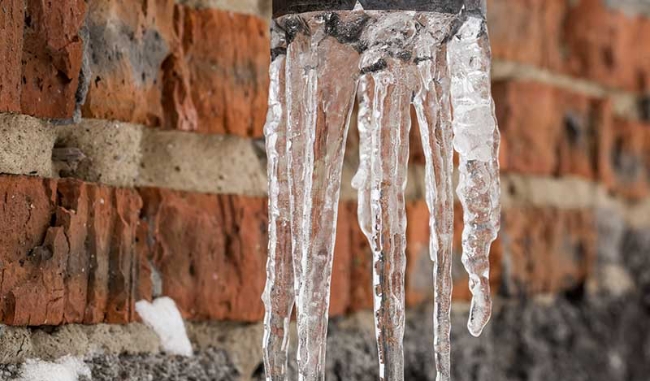Tips to Avoid Frozen Pipes in Winter: Professional Tips
Tips to Avoid Frozen Pipes in Winter: Professional Tips
Blog Article
On this page down the page you can find some great information and facts in regards to Winter Plumbing Precautions: Preventing Frozen Pipes.

Cold weather can damage your pipes, especially by freezing pipes. Right here's just how to avoid it from occurring and what to do if it does.
Intro
As temperature levels decrease, the danger of frozen pipelines rises, potentially bring about pricey repairs and water damages. Comprehending how to avoid frozen pipes is critical for house owners in chilly climates.
Avoidance Tips
Insulating vulnerable pipelines
Cover pipelines in insulation sleeves or use heat tape to protect them from freezing temperatures. Focus on pipelines in unheated or external areas of the home.
Home heating strategies
Maintain interior spaces appropriately heated, particularly locations with plumbing. Open cupboard doors to enable cozy air to flow around pipes under sinks.
How to identify frozen pipes
Seek lowered water flow from taps, uncommon odors or noises from pipes, and noticeable frost on revealed pipelines.
Long-Term Solutions
Architectural adjustments
Think about rerouting pipelines far from outside wall surfaces or unheated locations. Include added insulation to attic rooms, cellars, and crawl spaces.
Updating insulation
Invest in high-quality insulation for pipelines, attic rooms, and wall surfaces. Correct insulation aids preserve consistent temperatures and lowers the threat of icy pipelines.
Safeguarding Exterior Plumbing
Garden tubes and exterior faucets
Detach and drain garden tubes before winter months. Install frost-proof spigots or cover outdoor taps with shielded caps.
Understanding Frozen Pipelines
What creates pipelines to ice up?
Pipelines ice up when exposed to temperatures listed below 32 ° F (0 ° C) for extended durations. As water inside the pipelines freezes, it broadens, taxing the pipeline walls and potentially triggering them to rupture.
Risks and damages
Icy pipes can lead to water supply disturbances, property damage, and pricey repairs. Ruptured pipelines can flooding homes and cause extensive structural damages.
Indicators of Frozen Piping
Identifying frozen pipelines early can stop them from rupturing.
What to Do If Your Pipes Freeze
Immediate activities to take
If you believe icy pipes, maintain taps open to eliminate stress as the ice thaws. Use a hairdryer or towels taken in hot water to thaw pipes gradually.
Final thought
Preventing icy pipes calls for positive measures and quick reactions. By recognizing the reasons, signs, and preventive measures, property owners can safeguard their plumbing throughout winter.
Helpful Tips to Prevent Frozen Pipes this Winter
UNDERSTANDING THE BASICS: WHY PIPES FREEZE AND WHY IT’S A PROBLEM
Water freezing inside pipes is common during the winter months, but understanding why pipes freeze, and the potential problems it can cause is crucial in preventing such incidents. This section will delve into the basics of why pipes freeze and the associated problems that may arise.
THE SCIENCE BEHIND FROZEN PIPES
When water reaches freezing temperatures, it undergoes a physical transformation and solidifies into ice. This expansion of water as it freezes is the primary reason pipes can burst. As the water inside the pipe freezes, it expands, creating immense pressure on the walls. If the pressure becomes too great, the pipe can crack or rupture, leading to leaks and water damage.
FACTORS THAT CONTRIBUTE TO PIPE FREEZING
Low Temperatures: Extremely cold weather, especially below freezing, increases the risk of pipes freezing. Uninsulated or Poorly Insulated Pipes: Pipes located in unheated areas, such as basements, crawl spaces, or attics, are more prone to freezing. Insufficient insulation or lack of insulation altogether exacerbates the problem. Exterior Wall Exposure: Pipes running along exterior walls are susceptible to freezing as they encounter colder temperatures outside. Lack of Heating or Temperature Regulation: Inadequate heating or inconsistent temperature control in your home can contribute to frozen pipes. PROBLEMS CAUSED BY FROZEN PIPES
- Pipe Bursting: As mentioned earlier, the expansion of water as it freezes can cause pipes to burst, resulting in significant water damage.
- Water Damage: When pipes burst, it can lead to flooding and water damage to your property, including walls, ceilings, flooring, and personal belongings.
- Structural Damage: Prolonged exposure to water from burst pipes can compromise the structural integrity of your home, leading to costly repairs.
- Mold and Mildew Growth: Excess moisture from water damage can create a favorable environment for mold and mildew growth, posing health risks to occupants.
- Disrupted Water Supply: Frozen pipes can also result in a complete or partial loss of water supply until the issue is resolved.
WHY CERTAIN PIPES ARE MORE PRONE TO FREEZING
- Location: Pipes located in unheated or poorly insulated areas, such as basements, crawl spaces, attics, or exterior walls, are at higher risk of freezing.
- Exterior Pipes: Outdoor pipes, such as those used for irrigation or exposed plumbing, are particularly vulnerable to freezing as they are directly exposed to the elements.
- Supply Lines: Pipes that carry water from the main water supply into your home, including the main water line, are critical to protect as freezing in these lines can affect your entire plumbing system.
- Underground Pipes: Pipes buried underground, such as those connected to sprinkler systems or outdoor faucets, can be susceptible to freezing if not properly insulated.
https://busybusy.com/blog/helpful-tips-to-prevent-frozen-pipes-this-winter/

I stumbled upon that page about How to prepare your home plumbing for winter weather when doing a lookup on the search engines. Are you aware of someone else who is very much interested in the niche? Please feel free to share it. Kudos for being here. Revisit us soon.
Click Here Report this page